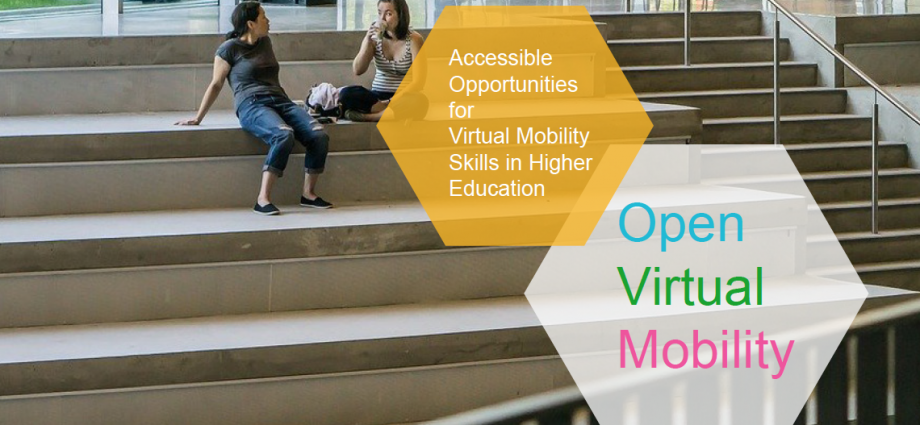PROJECT TITLE
OpenVM: Opening Education for Developing, Assessing and Recognising Virtual Mobility Skills in Higher Education (short: OpenVM)
COORDINATOR:
- Beuth University of Applied Sciences Berlin
- https://www.beuth-hochschule.de/
NATIONAL AGENCY
- Deutscher Akademischer Austauschdienst (DAAD)
- German Academic Exchange Service
- Website: www.eu.daad.de
PROJECT START AND END DATE
- START: 01-09-2017
- END: 31-08-2020
- DURATION: 36 months
PROJECT TOTAL GRANT
439.830,00 EUR
ERASMUS+ KEY ACTION
- Cooperation for innovation and the exchange of good practices
- Strategic Partnerships for higher education
- Development of Innovation
PROJECT BROCHURE
Download the full document (26 pages, PDF, 1,6MB)CONTEXT/BACKGROUND OF THE PROJECT
Higher Education Institutions face high requirements and challenges in today’s global world, including internationalisation as a response to globalisation.
Virtual Mobility (VM) has a great potential to contribute to the internationalisation, innovation and inclusion in HE (higher education). While it is feasible to encourage outward and inward student and faculty mobility in HE, the main limitations are the high costs, socio-economic, political and health-related issues. These barriers can be dramatically reduced by adding the virtual component to mobility, thus making mobility accessible to all.
Yet, despite numerous Virtual Mobility initiatives and projects in the past years, the uptake of Virtual Mobility in HE is still low and the possibilities of VM including Virtual Internships/Placements unknown to many educators and students.
Virtual Mobility can develop its potential, provided HE leaders, educators, students and other relevant stakeholders, such as International Offices, know about and can/want to use the opportunities of VM. This means HE institutions, educators and students need the necessary skills, confidence and readiness to initiate and implement VM Actions. The aim of this project is to enhance the VM readiness of HE institutions, educators and students through achievement, assessment and recognition of Virtual Mobility Skills.
The openVM project addresses the need of creating accessible opportunities for achievement of Virtual Mobility Skills to ensure higher uptake of Virtual Mobility in HE in Europe, by supporting HE institutions, educators and students in acquiring, assessing and recognising Virtual Mobility Skills, i. e. key competencies needed to successfully design, implement and participate in VM actions.
OBJECTIVES OF THE PROJECT
The openVM project aims at promoting and scaling-up VM in HE in Europe through achievement, assessment and recognition of Virtual Mobility Skills of HE educators and students in line with the Bologna and Open Education principles. The key objectives of the openVM project are:
- To enhance the uptake of VM in HE by improving VM Skills and in consequence the readiness for VM in HE.
- To improve the achievement and recognition of VM Skills of HE institutions, educators and students.
- To create a European VM Learning Hub for achievement, assessment and recognition of VM Skills as a central reference point.
- To develop a set of innovative tools and methods to enhance achievement, assessment and recognition of VM Skills.
- To provide sustainable infrastructure, resources and guidelines for enhancement of VM Skills, design and implementation of VM in HE in Europe.
- To provide evidence about how assessment and credentialing of VM Skills contributes to the uptake VM.
APPROACH AND INNOVATION IN OPENVM PROJECT
To achieve this, openVM applies the principles of Open Education to promote achievement, assessment and recognition of VM Skills. Both VM and OE aim to enhance participation in international knowledge flows, use of digital media, improve teaching and learning by setting international benchmarks, attract and keep talents for the economy and research systems, innovate and build capacity.
Key innovations in openVM are:
- Online, Open & Flexible Higher Education approach to promoting the achievement, assessment and credentialing of VM Skills
- Innovative pedagogies for achievement of VM Skills, such as Open Learning by Design and Crowd Creation of OERs and MOOCs
- Innovative approaches/technologies for assessment and recognition of VM Skills: Evidence-based assessment, Open Credentials (Open Badges, Blockcerts), semantic/machine-readable description of VM Skills with links to competency frameworks
- Engaging and effective learner experience in a Personal Learning Environment making use of gamification designs
OUTCOMES OF THE OPENVM PROJECT
The main outcomes of the project are:
- O1: Conceptual Framework and Guidelines for achievement, assessment and recognition of VM Skills in HE
- O2: Virtual Mobility Learning Hub as a central reference point for VM Skills in Europe
- O3: Semantic Competency Directory and Matching Tool as Smart Tools supporting learning, assessment and recognition of VM skills
- O4: E-Assessment Concept and Tool for innovative, open and evidence-based assessment of VM Skills
- O5: Open Credentials and Gamification for recognition of VM Skills and engaging/effective learner experience
- O6: OER, MOOC and Pilots for innovative pedagogies for achievement of VM Skills and validation
- O7: Quality, Dissemination, Sustainability for quality-assurance, broad outreach and sustainability of project results
EXPECTED IMPACT OF THE OPENVM PROJECT
- Increased awareness of Virtual Mobility in HE in Europe
- Established Leadership in assessment and recognition of VM Skills
- Increased readiness and confidence of educators and students to participate in and implement VM
- Sustainable Learning Hub for the continuous development, assessment and recognition of VM Skills
- Enhanced transparency about the distribution and level of VM Skills in HE in Europe



Comments are closed, but trackbacks and pingbacks are open.